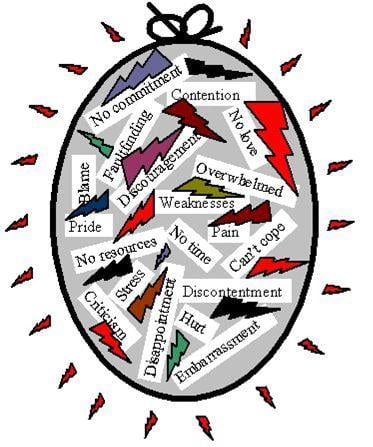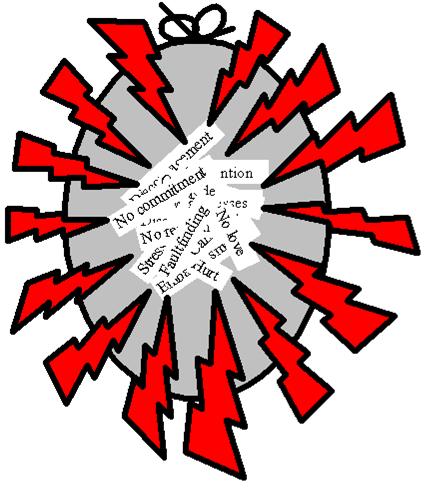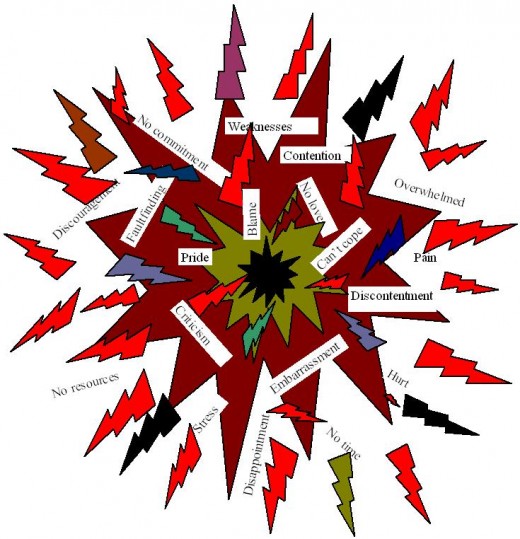What Is Anger Made Of?
Anger is a Strong Emotion

Anger is Unresolved Negative Emotion
Anger is a strong emotion. It occurs when we are faced with situations or behaviors we do not like or agree with. The automatic reaction to these situations is a strong negative feeling that permeates us. Anger is both psychological and physiological, therefore it affects us totally: i.e. our physical, emotional, spiritual, social, and intellectual well being. Anger can result from a combination of two or more emotions that become jumbled or stacked on top of one another. These emotions, left unresolved, fester and grow.
Disappointment
Disappointment is the let down that occurs when we expect something to happen and it does not. Examples are: a phone call not returned from a friend, a paycheck that is late, or a child not doing a household chore. The event that was expected brings high hopes and anticipation, then when it does not take place, the resulting feelings are of low self-worth and dislike for the person or party that did not follow through.
Disappointment will happen because the world is not perfect. Allowing feelings of disappointment to fester gives rise to anger. Instead of becoming angry, recognize disappointment for what it is. Accept it as a part of life. Work with others in setting realistic expectations and feelings of anger and frustration will be minimized.

The Desire for Control
Control comes from two different sources, inside or outside. Inward control is control of ourselves. Unfortunately, the desire for self-control often leads to perfectionism. The perfectionist desires control to the point that ideals become a sword with which we cut ourselves down. Self-criticism and self-condemnation lead to a chronically angry disposition and the adoption of self-destructive habits.
Outward control is control by others, or our own desire to control others. The desire for power and control increases greatly if we do not have control of our own appetites and passions. Checking our motives will help us discover whether control is an issue. Both inner and outer control can be checked by seeking to understand and persuade rather than to manipulate and control.
Unresolved Guilt
There are two types of guilt, productive and unproductive. Productive guilt leads to a change of actions and is the first step in the repentance process. Self-searching and analysis follow, along with recognition of wrong and remorse for the pain and suffering caused. Eventually, a desire is kindled to restore that which was lost, seek forgiveness and resolve to change for the better.
Unproductive guilt turns us inward, attacking ourselves and destroying rather than changing. Conflicting circumstances often bring unproductive guilt. Looking at the long-term implications of the problem will help. Ten or twenty years later in life, what decision will have the most positive consequences? Find out what others have done and how they felt afterward helps. Project into the future and ask, “What will I wish I had done?” In this way, unproductive guilt changes to positive action, and peace of mind follows.

Stress
Stress occurs when we see more to do than the amount of time we are given. We feel an intense pressure to either perform or abandon, to fight or flee. The adrenal glands are pumping adrenalin into the blood system and the nerves are on edge. Stress is the opposite of relaxation. Unresolved stress leads to anger.
If we try to identify the stressor and deal with it immediately, stressful feelings will be minimized. Our personal stress increases when energy levels are low. Lack of sleep, poor nutritional habits, and lack of exercise also increase stress. Personal resiliency to stress increases with good personal habits, decision-making and conflict resolution skills.
Frustration
We become frustrated when we are dissatisfied with the process or outcome experienced. When relationships do not go how we expect, it is easy to become frustrated. Working at a job where we do not have the knowledge or proper tools to complete work in an acceptable manner brings automatic frustration.
Asking for help when it is needed keeps frustration from becoming anger. It means setting aside our pride, and developing humility, yet the outcome is worth the effort. We may have to put our own desires off for a time, but we will find that the resulting knowledge and understanding paves the way for better times ahead.
What is your anger made of?
Lack of Time and Resources
Lack of time and resources cause a pre-occupation of the mind to the point that personal or family needs become oblivious and unattended. Blaming is a natural tendency if there are circumstances out of our control that contribute to lack of resources. Anger may be directed toward society, the workplace, and even the government.
Unfortunately, the situation is often worsened by the abuse of chemicals that increase the inability to cope. Turn around this type of situation by getting needed assistance. Let go of the blame. Give it to God and let him deal with it. Ask for his help in improving the situation. He will guide and direct us to the resources we need. Once we let go of the blame, we will find additional time for learning.
Unresolved Negative Emotions
Anger is one or more negative emotions that are left unresolved over a period of time. Much like an allergic reaction, the body can tolerate a certain level of the allergen or substance. The reaction happens only when the level is past the point of tolerance. People who are very sensitive reach the toleration point sooner than others. Watch for the following emotions as well:
- Feeling overwhelmed
- Blaming others
- Criticism
- Fault-finding
- Discontentment
- Making assumptions
- Embarrassment
- Unresolved past hurt
Everyone is different. Understanding our own sensitivities and reactions to others will help us understand and deal with anger. The key is recognizing what the emotion is and resolving it rather than allowing it to fester. Once anger builds up, it must be released, and the result can be devastating. Allowing it to turn inward is just as harmful. Far better is the ability to recognize that negativity is a part of life and must be dealt with, just as the cold and snow of winter. We cannot make January go away by tearing it off of the calendar, rather we become stronger, wiser, and better, in our ability to handle the negative.
This content is accurate and true to the best of the author’s knowledge and is not meant to substitute for formal and individualized advice from a qualified professional.
© 2012 Denise W Anderson







